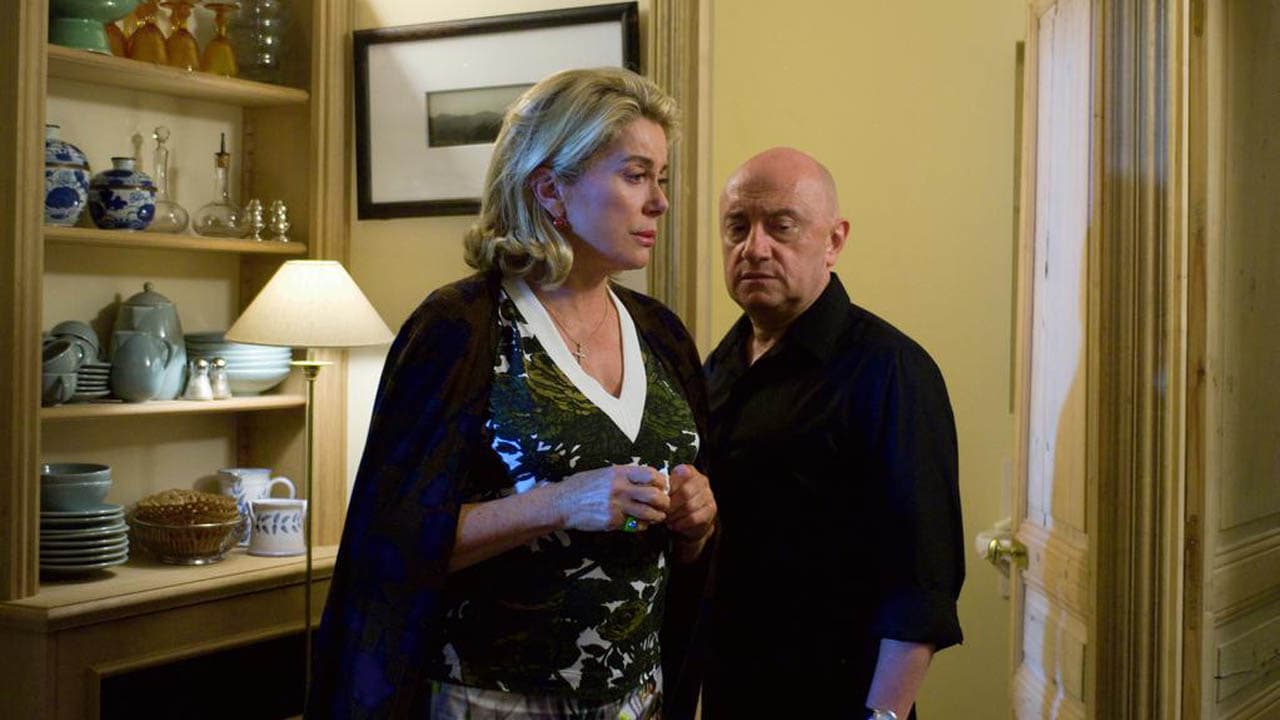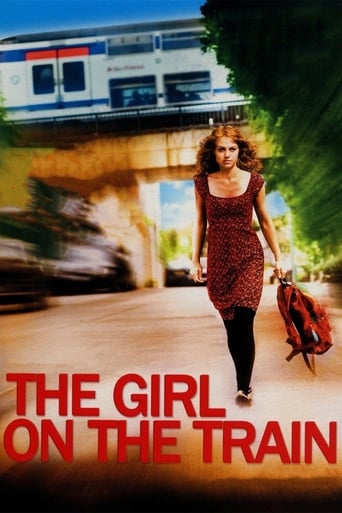



Very well executed
just watch it!
if their story seems completely bonkers, almost like a feverish work of fiction, you ain't heard nothing yet.
View MoreThere's a more than satisfactory amount of boom-boom in the movie's trim running time.
View MoreThere have been three films and two novels with the title THE GIRL ON THE TRAIN. (There is also a novel called GIRL ON A TRAIN.) The earlier novel was written by my friend Peter Whitehead, but it has never been filmed. The second novel was made into the third film. Of the three films, this was the first, though its title in French was very different, namely LA FILLE DU RER (THE GIRL OF THE R.E.R.). For those unfamiliar with the underground systems of Paris, there are two. The first is the well-known Metro, which goes short hops a few minutes apart. The second is called the R.E.R. It goes for long distances between a few main stops and extends way out to the far suburbs, being a genuine rapid transit system for commuters. So the girl of this story is not really on a train per se, she is merely on a commuter service which starts overground and goes underground when it reaches the centre of Paris. Four years later, a less well known film of the title was made in America, with its action commencing at New York's Grand Central Station. And in 2016, a British film of this title was made with Emily Blunt, which has had a considerable commercial success and is the best known of the three. This one is a brilliantly made film by that old pro, André Téchiné. He directs films as effortlessly as water flows under a bridge. But that is not to say that the film is wholly satisfying. The script is very good, but the story conception is somewhat perplexing, with insufficient background information. Hence it lacks focus, unlike the cameras.The director presumably must have wanted to make a film which remained enigmatic and suggestive, leaving us guessing about the layers beneath. That must have been his intention, and in that he succeeded. But is that really effective? The central character in the film is a very young woman, really still a girl, who is 'all mixed up', to say the least of it. No effort is made to get us to sympathise with her, nor is any made to get us to dislike her. We are meant to be puzzled observers. It is clear from the very beginning that she is wilful, foolish, pig-headed, and astonishingly stupid. She has a vague childlike charm, but she also can snarl and pout at the drop of a hat. Her father was an Army officer who was killed in battle in Afghanistan when she was 5, and she has been raised by a rather aloof mother, played by France's leading ice queen, Catherine Deneuve. Deneuve shows a surprising amount of diffused and unfocused sympathy, clearly trying hard to love her child but finding it difficult. The daughter tells her very sinister drug-dealer boyfriend that she and her mother are so close that they are 'inseparable', but that is merely one of the girl's many disembodied fantasies. She wants to be loved but is not at all discriminating about who might do so. In other words, she is a lost young soul wandering the world, dressed only in a smile. The girl is played to perfection by an extremely talented young Belgian actress, Émilie Dequenne, who at 28 looked and behaved younger. She played Valentine in the 2006 film of LE GRAND MEAULNES. The girl inexplicably goes to pieces and fabricates a sensational tale of having been assaulted by anti-Semites while travelling on the RER. Before boarding it, she had cut herself with a knife to make a gash on her face, cut off part of her hair, and drawn swastikas (as it happens, the wrong way round) on her stomach. She then goes to the police and claims this was all done to her by neo-fascist yobs. This causes a scandal in the press and even the President of the Republic issues a statement of sympathy for her. But then her story unravels when it is realized that she made it all up. She does not appear to realize why she did this, nor can anyone else figure it out. She is not even Jewish. The story is far more complicated than this, and involves penetrating studies of several characters, resulting in a tapestry portrait of some intersecting lives and groups of people constituting a haphazard milieu, all of whom are in their own ways deeply perplexing. So I suppose the director wanted us to know just how strange everyone really is. I believe him.
View MoreJeanne (Émilie Dequenne) is a beautiful roller blading girl. Her mother Louise (Catherine Deneuve) was an ex to prominent Jewish crusading lawyer Samuel Bleistein. Jeanne fails to get a job with him. She starts dating sketchy Franck. He's arrested and then he rejects her. She's heartbroken and fakes an attack by neo-Nazis on a train even cutting herself.She's an enigma wrapped in a mystery performed by a blank actress. I don't feel like the movie explain anything about her. Dequenne is a beautiful girl but I don't get a sense of her character. In many ways, she is the least interesting character in the movie. As for the story, it's not terribly intense or dramatic. The danger for her is so low. This is supposedly inspired by true events. It does make me wonder about the real story. This could have been a great exciting character study.
View MoreA feckless young woman, Jeanne, lives with her mother in the suburbs of Paris and loves roller-blading. Looking for work, Jeanne applies for a position with an activist Jewish lawyer, Bleistein, a former admirer of her mother's - but she prepares badly, tells fibs to cover her shortcomings and is caught out. After failing to get the job, Jeanne impulsively hooks up with an edgy tattooed wrestler, Frank, who also loves roller-blading, and they soon become lovers. Some time later a friend of Frank's asks the pair to house-sit an apartment above his electronics warehouse while he's away on vacation, but unknown to Jeanne, the warehouse is a drug-dealing front and Frank is in on the deal. One day, while Jeanne is out, Frank is seriously wounded by a buyer, and as a consequence both of them are arrested. Despite facing a long sentence, Frank convinces the police of his girlfriend's innocence - but blames her for his bad luck and callously ends their relationship. Jeanne's response to this rejection is somewhat extreme. She gives herself some shallow cuts and daubs a Nazi swastika on her body in a mirror, before claiming that she'd been mistaken for a Jew, and attacked by some anti-semitic thugs. Her story creates a press sensation, but soon falls apart when the police scrutinize her account. Jeanne stubbornly refuses to recant, so her mother contacts Bleistein to help elicit a confession. The two women pay a visit to the lawyer's country home, and after a stormy night of self-examination, Jeanne decides to face the music - whereupon she receives a light sentence and roller-blades off into an unknown future.'The Girl on the Train' is graced with a sensitive performance by Emilie Dequenne in the lead role. As Jeanne's story unfolds, it reveals how life's apparent randomness conceals deeper patterns. Techine punctuates the action with imagery of trains and roller-blades - the trains speeding doggedly across the suburban landscape on their way to fixed destinations - whereas Jeanne meanders through parks on her roller-blades, her life lacking both direction and goal. 'The Girl on the Train' should be interpreted as an esoteric parable of liberation. Jeanne is imprisoned by time and place, but she's on the verge of infinite freedom. She lives in a world where everybody lies to her for their own convenience or advantage - and her alienation from society is a reflection of her discomfort with its pervasive mendacity. She has become infected with this sickness - and what is destroying her, must be her cure. Using the same strategy as Sarah Woodruff in 'The French Lieutenant's Woman', Jeanne ritually marks herself with blood and a sacred symbol (a Sanskrit swastika) for her rite of passage, and then fabricates an absurd racist assault in order to disgrace herself - knowing she will be disbelieved and dishonored - thereby liberating herself from society's norms. By the film's conclusion Jeanne has swapped traditional roles with the bourgeois Jewish lawyer - his family disintegrating in disputes over empty rituals - and transformed herself into the wandering Jew of her unbelievable tale. She has been through the fire, acknowledged her sins, accepted her penance and is roller-blading through life armed with self-realization. She has conquered herself, and become one of Joseph Campbell's Heroes with a Thousand Faces.
View MoreThe Girl on the Train (2009)The hook that made this movie successful is not enough to make the movie good. The added plot in the first half fizzles and seems ultimately irrelevant. Yes, the main actress plays the part of an "airhead," as the subtitle translates her stupidity. But the movie itself has some of the same disease. It lacks formal intelligence, and it stretches out a few basic ideas over 105 minutes, posing as a serious movie with serious implications.Not that it's misery to watch. In a way, the fact that you get sucked in waiting and waiting for some basic conflict to formulate says something about the acting and editing. This is contemporary Paris, or a cozy, idealized side to it. And you can't dismiss the theme of anti-Semitism, which gets some elaboration and complexity as you go, including some great, if simplified, conversations between Jews at their country house about what it means to be a contemporary Jew. It's conveniently packaged, but adds some needed interest to the events.This leads eventually to a rather long and oddly placed bar mitzvah celebration, and some more roller blading filler. It's a frustrating thing to see all this content watered down by a single turn of events, the faked hate crime attack, which happens well past the halfway point of the movie. And around which the suspense of being fooled is left out of the movie, because we are told everything as it happens.
View More